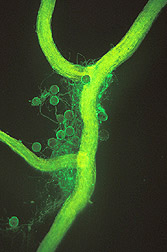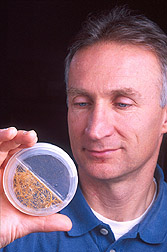This page has been archived and is being provided for reference purposes only. The page is no longer being updated, and therefore, links on the page may be invalid.
Knowledge of Nitrogen Transfer between Plants and Beneficial Fungi Expands
By Jim CoreJune 9, 2005
New findings show that a beneficial soil fungus plays a large role in nitrogen uptake and utilization in most plants.
In the current issue of the journal Nature, Agricultural Research Service (ARS) chemist Philip E. Pfeffer and cooperators report that beneficial arbuscular mycorrhizal (AM) fungi transfer substantial amounts of nitrogen to their plant hosts. A lack of soil nitrogen often limits plant growth.
The studies were conducted by Pfeffer and David Douds at the ARS Eastern Regional Research Center, Wyndmoor, Pa.; Michigan State University scientists headed by Yair Shachar-Hill; and New Mexico State University scientists headed by Peter J. Lammers and including graduate student Manjula Govindarajulu.
AM is the most common type of symbiotic fungus that colonizes the roots of most crop plants. The fungi receive glucose and possibly other organic materials from the plant, while enhancing the plant's ability to take up mineral nutrients, primarily phosphorus.
The scientists previously identified enzymes and genes involved in nitrogen absorption and breakdown in AM fungi, but very little was known about how nitrogen is moved from fungus to plant or in which form nitrogen moves within the fungus.
The researchers discovered a novel metabolic pathway in which inorganic nitrogen is taken up by the fungi and incorporated into an amino acid called arginine. This amino acid remains in the fungus until it is broken down and transferred to the plant.
The results show that the symbiotic relationship between mycorrhizal fungi and plants may have a much more significant role in the worldwide nitrogen cycle than previously believed. With this in mind, farmers may benefit from promoting the proliferation of mycorrhizal fungi through diminished fertilizer input, thereby making more efficient use of the nitrogen stores in agricultural soils.
ARS is the U.S. Department of Agriculture's chief scientific research agency.



